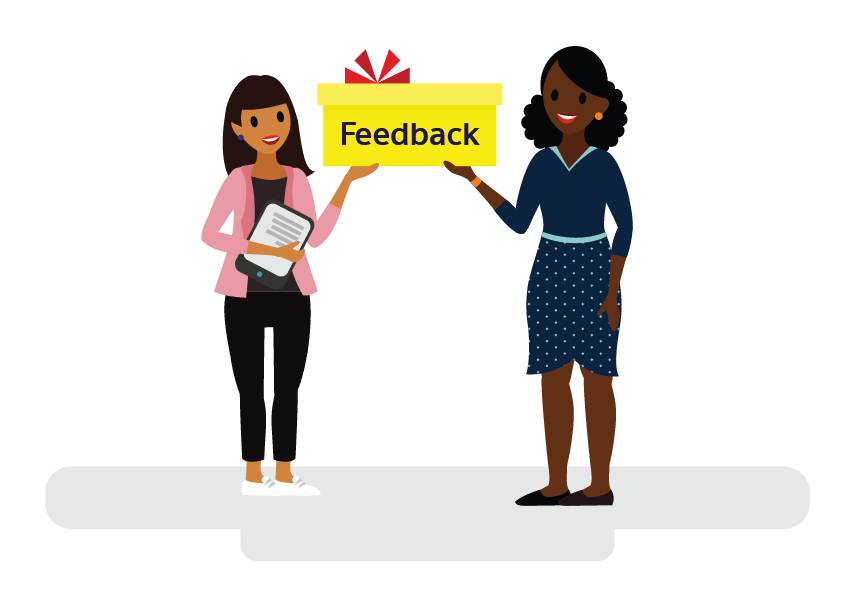Get to Know Yourself As a People Leader
Learning Objectives
After completing this unit, you’ll be able to:
- Explain how to build self-awareness as a people leader and why it’s important.
- Identify ways to solicit useful feedback on your strengths and development opportunities.
- Describe how to reflect on feedback from your manager, team members, and peers.
Building Self-Awareness
How well do you know yourself as a people leader? Do you already have a sense of what you’re good at and where you can improve? If you do, you’re on your way to developing one of the most important qualities a leader can have—self-awareness.
Being self-aware as a people leader means that you recognize and take accountability for your strengths and opportunities for development (including any hidden biases). You understand how your actions might affect others, and you consistently solicit feedback in order to improve.
Being aware of your superpowers and your kryptonite is what allows you to lead authentically, build strong and successful teams, and ultimately get better results!

Knowing yourself as a people leader is no small feat, though. It requires a lot of careful observation (of both yourself and others) and some serious self-reflection. So, where do you start? It’s a matter of simply considering what you’re already doing well, where you can improve, and how you can grow. This self-assessment is a good starting point for developing self-awareness, but an even better way to get to know yourself as a people leader is by…
Asking for Feedback
Those who work most closely with you can provide great insight into your strengths and opportunities for development. Start by asking your own manager for their perspective. Then, ask the team members who see you in action every day how you’re doing. Finally, reach out to peers and colleagues who are familiar with your work to get their take.
Keep in mind that giving constructive feedback isn’t always easy. Your manager, team, or peers might be anxious about sharing their honest feelings. Even sharing positive feedback sometimes can feel uncomfortable.
To make the process a little easier, try to establish an environment in which everyone feels safe to speak freely. Emphasize that you welcome honest opinions and that all feedback—no matter if it’s positive or negative—will help you learn how to become a better people leader.
Here are a few dos and don’ts for building a sense of psychological safety and getting helpful feedback on your strengths and opportunities for improvement:
| Do: | Don’t: |
|---|---|
|
Ask specific, focused questions. Example: “What should I continue doing that is working well? What’s one strength I demonstrate when leading the team?” |
Ask vague or closed-ended questions, or focus on the negative. Example: “What feedback do you have for me? Am I doing a good job leading the team? Yes or no? What am I doing wrong?” |
|
Listen to feedback openly, and be honest about areas that need improvement. Example: “That’s a fair assessment. What can I do differently to better support you?” |
Become defensive or dismissive, even with your body language (e.g., crossing your arms or rolling your eyes) Example: “Nobody understands what I’m going through. You’re the only person on the team who’s given me that feedback, anyway, so I’m not sure it’s accurate.” |
Finally, don’t forget to thank the individuals who have taken the time to give their feedback!
Reflecting on Feedback
After you’ve gathered feedback, it’s time for a little reflection. Follow these steps:
1. Think about the feedback you’ve received as a people leader. Ask yourself:
- Which manager behaviors are my strengths? What am I doing well?
- What examples did my team provide that show my strengths in action?
- Which behaviors can I develop? What can I do better or differently?
2. Look at your past performance reviews. Ask yourself:
- What strengths and opportunities for development did my manager highlight?
- Where did I perform best? Where did I struggle?
3. Assess the feedback. Ask yourself:
- Is the feedback valid/accurate? Do I need another opinion, or should I dig deeper into why I might be questioning this feedback?
- Is the feedback important? Is it regarding a specific manager behavior?
- Do I want to change? What is the benefit of changing? What is the cost if I don’t change?
Remember, feedback is a gift. It allows you to develop a self-awareness that is absolutely key to your becoming the best leader you can be. Afterall, you can’t change what you don’t know about yourself!

Ready to act on all of the feedback you’ve received? Keep reading, because in the next unit, you’ll learn how to use it to build and implement a development plan for becoming a great people leader.
